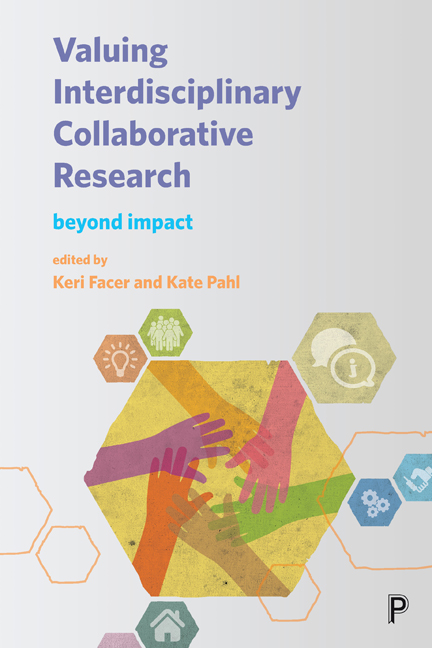SECTION 2 - Understanding collaborative research practices: a lexicon
Published online by Cambridge University Press: 05 April 2022
Summary
Collaborative interdisciplinary research processes, as we have seen in the preceding chapters, necessarily unsettle assumptions about expertise and about what counts as a valuable ‘research outcome’. What we have found is that part of the challenge of evaluating these sorts of projects is the development of a language to talk about how project teams held open spaces for new possibilities to form and new ideas to emerge in ways that then could transmute and cross boundaries. This way of working is very different from linear models of research that have clear lines of causality and in which research ‘ideas’ are associated with particular individuals in the form of intellectual property. Instead, these ways of conducting research are enmeshed, entangled and complex, and are associated with divergent outcomes as well as sometimes-difficult experiences and contrasting clusters of ideas.
This complexity, however, is not a reason to think we need to start from scratch as we seek to find a language for talking about and evaluating this sort of work. Rather, it is an injunction to seek out the existing theoretical and methodological resources we might already have at hand to help us make sense of these process-based, contingent and emergent ways of working. Such problems have, after all, been explored before in other contexts.
A lexicon for making sense of collaborative, interdisciplinary research
It is very easy, when confronted with such highly diverse and locally situated forms of research practice, to throw up your hands and say that any attempt to develop a language to understand and make sense of such work is unachievable and will necessarily over-simplify. And indeed, it would be folly to attempt to produce a standardised one-size-fits-all framework against which such projects could be assessed. If we do not attempt to find a way of describing and articulating the key features of this research, however, we risk allowing it to be assessed and valued by measures which are patently inadequate. Moreover, without some way of talking about its common characteristics we lose the opportunity to find common ground on which we can discuss what constitutes high-quality practice, and so develop and improve how we work.
- Type
- Chapter
- Information
- Valuing Interdisciplinary Collaborative ResearchBeyond Impact, pp. 215 - 232Publisher: Bristol University PressPrint publication year: 2017



